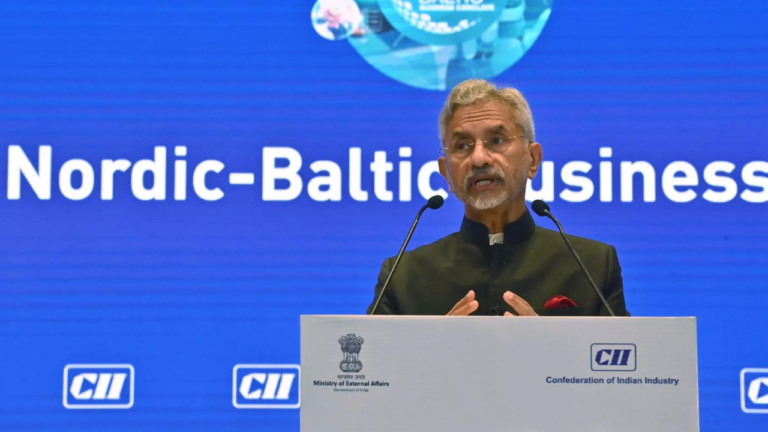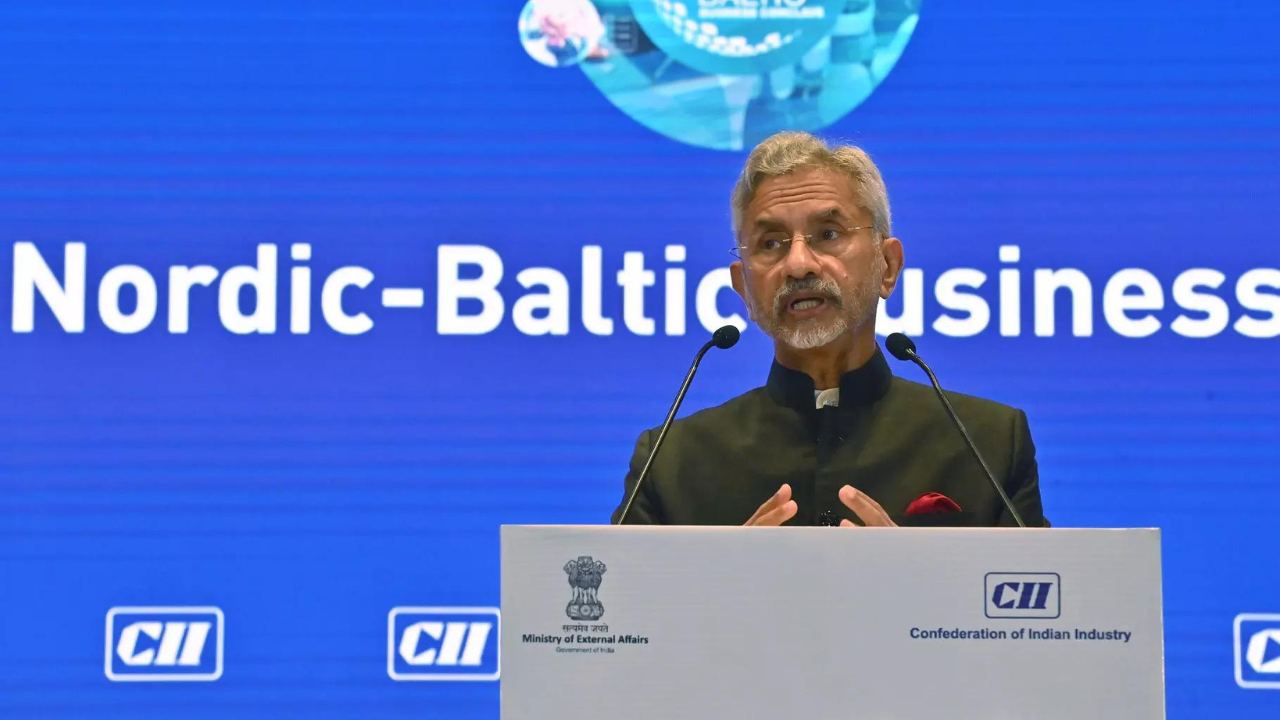
[ad_1]
NEW DELHI: External affairs minister S Jaishankar on Wednesday stressed that India’s engagement with the Nordic-Baltic Eight (NB8) has expanded in the last few years, adding that “appropriate institutional frameworks” with countries in the grouping are also being established for “closer business-to-business cooperation.”
Addressing the second CII India Nordic Baltic Business Conclavein the national capital, Jaishankar said, “Our engagement with the NB8 countries has expanded clearly in the last few years.We opened our embassies in Tallinn in December 2021 and in Vilnius this year in March.”
He said that India will be opening a resident embassy in Latvia very soon.
Moreover, he said, “Finland has opened a consulate in Mumbai.”
Jaishankar highlighted the increase in mobility between India and Finland. “Direct flights between India and Finland and India to Denmark are facilitating mobility between our countries.”
“Appropriate institutional frameworks with NB8 countries are also being established for closer business-to-business cooperation. With Finland, we have established sustainability partnerships, digitalization, and education dialogue,” the external affairs minister said.
Jaishankar also noted the relations with Denmark, stating, “With Denmark, our green strategic partnership is strengthening and facilitating collaborations in water solutions, wind energy, green hydrogen, and agriculture. We also look forward to stronger cooperation with the Faroe Islands and with Greenland.”
18 nations and 19 major global companies have joined India’s leadership for industry transition with Sweden the LeadIT initiative, which he said has clearly borne fruit in the last few years.
“More than 260 Swedish companies are in India, working in innovation, in construction, in defence, and in clean technology,” he said.
Saab, the Swedish Aeroplane Corporation, is going to set up a manufacturing facility in India, he said.
Meanwhile, India and Iceland are working closely on harnessing geothermal energy in Ladakh and Himachal Pradesh. Similar projects are being planned for Northeast India.
“Efforts are on to establish a centre for excellence in cold and warm water fisheries. We have also forged strong cooperation with Norway to harness the potential of the blue economy, wind, and geothermal energy, as well as polar studies, green shipping, water management, space, and health,” Jaishankar said.
With the Baltic nations, India has been conducting official-level interactions and is seeking to explore new avenues for stronger cooperation in e-governance, cyberspace, the internet of things, startups, defence technology, supply chain, and logistics. “There is clearly, however, much more work to be done,” Jaishankar said.
The second CII India Nordic Baltic Business Conclave is significant as it reflects the growing awareness of two regions about the possibilities and opportunities in cooperation, the Union Minister said.
“This certainly speaks of a more globalised era, but from India’s perspective, it also speaks of an expanding footprint. The Baltic Sea and the Arctic region have re-emerged in strategic prominence, and conversations about future connectivity and logistics have business implications as well,” the Ministry of External Affairs said in a statement.
Notably, the NB8 countries collectively represent an economy of more than USD 2 trillion, with a population of about 33 million and a high standard of living.
Jaishankar further recalled the first two India-Nordic Summits that were held in Stockholm in April 2018 and in Copenhagen in May 2022, respectively.
“On these occasions, our leaders underlined the importance of a rule-based multilateral trading system, as well as an open and inclusive international order for global prosperity and growth,” he said.
They discussed vital issues relating to global security, economic growth, innovation, digital transformation, and climate change. We certainly noted the role of Nordic countries as innovation leaders in global growth.
“Now, along with the Nordic nations, the Baltic states too are at the forefront of innovations, start-ups, tech applications, and digital progress,” he added.
Addressing the second CII India Nordic Baltic Business Conclavein the national capital, Jaishankar said, “Our engagement with the NB8 countries has expanded clearly in the last few years.We opened our embassies in Tallinn in December 2021 and in Vilnius this year in March.”
He said that India will be opening a resident embassy in Latvia very soon.
Moreover, he said, “Finland has opened a consulate in Mumbai.”
Jaishankar highlighted the increase in mobility between India and Finland. “Direct flights between India and Finland and India to Denmark are facilitating mobility between our countries.”
“Appropriate institutional frameworks with NB8 countries are also being established for closer business-to-business cooperation. With Finland, we have established sustainability partnerships, digitalization, and education dialogue,” the external affairs minister said.
Jaishankar also noted the relations with Denmark, stating, “With Denmark, our green strategic partnership is strengthening and facilitating collaborations in water solutions, wind energy, green hydrogen, and agriculture. We also look forward to stronger cooperation with the Faroe Islands and with Greenland.”
18 nations and 19 major global companies have joined India’s leadership for industry transition with Sweden the LeadIT initiative, which he said has clearly borne fruit in the last few years.
“More than 260 Swedish companies are in India, working in innovation, in construction, in defence, and in clean technology,” he said.
Saab, the Swedish Aeroplane Corporation, is going to set up a manufacturing facility in India, he said.
Meanwhile, India and Iceland are working closely on harnessing geothermal energy in Ladakh and Himachal Pradesh. Similar projects are being planned for Northeast India.
“Efforts are on to establish a centre for excellence in cold and warm water fisheries. We have also forged strong cooperation with Norway to harness the potential of the blue economy, wind, and geothermal energy, as well as polar studies, green shipping, water management, space, and health,” Jaishankar said.
With the Baltic nations, India has been conducting official-level interactions and is seeking to explore new avenues for stronger cooperation in e-governance, cyberspace, the internet of things, startups, defence technology, supply chain, and logistics. “There is clearly, however, much more work to be done,” Jaishankar said.
The second CII India Nordic Baltic Business Conclave is significant as it reflects the growing awareness of two regions about the possibilities and opportunities in cooperation, the Union Minister said.
“This certainly speaks of a more globalised era, but from India’s perspective, it also speaks of an expanding footprint. The Baltic Sea and the Arctic region have re-emerged in strategic prominence, and conversations about future connectivity and logistics have business implications as well,” the Ministry of External Affairs said in a statement.
Notably, the NB8 countries collectively represent an economy of more than USD 2 trillion, with a population of about 33 million and a high standard of living.
Jaishankar further recalled the first two India-Nordic Summits that were held in Stockholm in April 2018 and in Copenhagen in May 2022, respectively.
“On these occasions, our leaders underlined the importance of a rule-based multilateral trading system, as well as an open and inclusive international order for global prosperity and growth,” he said.
They discussed vital issues relating to global security, economic growth, innovation, digital transformation, and climate change. We certainly noted the role of Nordic countries as innovation leaders in global growth.
“Now, along with the Nordic nations, the Baltic states too are at the forefront of innovations, start-ups, tech applications, and digital progress,” he added.
[ad_2]
Source link
